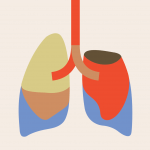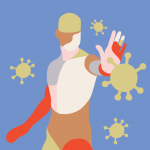How is Tabrecta Used for Lung Cancer?
- A recently FDA-approved oral drug called Tabrecta has shown some success in treating patients with metastatic non-small cell lung cancer (m-NSCLC).
- Tabrecta is a targeted therapy, which means it targets something specific in the body in an attempt to stop cancer growth.
- It works by blocking specific kinases (enzymes) in an attempt to keep cancer cells from growing and block the blood vessels that tumors need to grow.
- The medication is taken by mouth, and potential side effects such as swelling, fatigue, and nausea/vomiting should be discussed with your doctor beforehand.
Although this form of cancer grows comparatively slowly, it can spread to other parts of your body if treatment is delayed. When that happens, the disease is known as metastatic non-small cell lung cancer or m-NSCLC.
Read MoreWho is at Risk for Non-Small Cell Lung Cancer?
"Anyone can get lung cancer, but current and former smokers are most at risk for NSCLC," says Dr. Salman Punekar, medical oncologist at NYU Langone's Perlmutter Cancer Center and an assistant professor of medicine at NYU Grossman School of Medicine, told SurvivorNet. Other risk factors include:- Secondhand smoke
- Radiation exposure via cancer treatments, home radon or diagnostic imaging scans, specifically in the chest area
- Family history of lung cancer
- HIV
- Workplace exposure to asbestos, arsenic, nickel, tar or other chemicals including agricultural pesticides
- Air pollution
- Advanced age
What are the Symptoms?
In its early stages there are usually no symptoms. However, once the disease progresses you may experience:- Coughing up blood
- Difficulty breathing
- Chest discomfort or pain
- Facial swelling
- Fatigue
- Wheezing
- Hoarseness
- Loss of appetite
- Unexplained weight loss
How Can Tabrecta Help?
"Tabrecta is a targeted drug therapy that belongs to a class of drugs known as kinase inhibitors," explains Dr. Punekar. "It's one of many different targeted therapies that are used for m-NSCLC to slow or stop the growth of cancer cells."
Dr. Geoffrey Oxnard, a thoracic oncologist at Boston Medical Center, explains the lung cancer staging process.
How Does it Work?
Our cells have many different kinases (enzymes), which work to help control important functions in our body. However, certain kinases can be more active in some types of cancer cells such as m-NSCLC. Tabrecta works to block these kinases. This process may not only keep cancer cells from growing, but may also block the blood vessels that tumors need in order to grow.
How is Tabrecta Taken?
This medication should be taken regularly to get the most benefit from it. It's usually taken twice a day by mouth with, or without food, as directed by your doctor. The tablets should be taken whole and neither crushed or broken.
Since the dosage is based on your specific medical condition and your response to the treatment, do not increase or decrease the drug on your own, use it more often or take it for longer than prescribed. If you do, you may be risking serious side effects. If you vomit your dose do not take another dose; take your next dose at your regular scheduled time. If you forget to take a dose on schedule, do not take two doses at the same time. It will help to remember to take your medication by scheduling it for the same time every day. When it's effective, Tabrecta is usually prescribed as a long-term treatment.
Dr. Leena Gandhi, a thoracic oncologist, explains how doctors determine is targeted therapy is right for lung cancer patients.
What are the side effects?
Before using a new medication, it's always a good practice to read the Patient Information booklet from your pharmacy. This is true for Tabrecta. Do the same each time you get a new refill. Don't hesitate to ask your doctor or pharmacist if you have any questions about the drug.
Common side effects include:
- Edema or swelling, is the most common side effect. The edema usually occurs in the feet, hands, legs and ankles. Along with swelling, edema may cause other symptoms such as pain and tightness in the affected area.
- Fatigue
- Nausea and vomiting
- Decreased appetite and weight loss
- Constipation or diarrhea
- A change in certain blood tests
- Photosensitivity (when your skin is extremely sensitive to sunlight). Limit your time in the sun and avoid tanning booths and sunlamps. When outdoors, use sunscreen and wear protective clothing. Tell your doctor if you get sunburned or have skin blisters, or redness.
Other potentially serious side effects are possible as well.
"While much less common than the side effects listed above, some patients in clinical trials experienced serious lung problems known as interstitial lung disease (progressive scarring of lung tissue), pneumonitis (inflammation of the lungs) and liver damage," Dr. Punekar points out. "Keep in mind that some people using this drug may have other serious side effects."
Careful monitoring by your doctor may decrease your risk. Let your doctor know immediately if you are experiencing any lung problems that are getting worse, including:
- Shortness of breath
- Chest pain or cough
- Nausea or vomiting that doesn't stop
- A yellowing of your eyes or skin or a darkening of your urine which might indicate liver issues.
You should also get immediate medical attention if you are having other serious allergic reactions such as a rash, itching, swelling of your face or tongue, or dizziness.
What to Tell Your Doctor
In order for healthcare providers to decide on the best treatment for you, it helps them to have a complete picture of your present condition. Be sure to share the following information:
- Your medical history, especially liver disease and lung issues.
- If you have any allergies. Tabrecta may contain active ingredients that can trigger an allergic reaction.
- If you are having surgery, including dental work, let your healthcare provider know you
are taking this drug. - Any other prescription and non-prescription drugs and herbal supplements you take. Drug interactions can not only interfere with the way Tabrecta works, but it may also increase the chance of experiencing serious side effects.
- If you are pregnant or planning on getting pregnant. This drug may harm an unborn baby. If you or your partner become pregnant, speak with your doctor right away about the risks. Your healthcare provider should order a pregnancy test before you begin taking Tabrecta. Women and men using this medication should ask about reliable forms of birth control during treatment and for one week after stopping treatment.
Since this drug can be absorbed through your skin and lungs and may harm an unborn baby, women who are pregnant should not handle Tabrecta or breathe the dust from the tablets.
Questions to Ask Your Doctor
"It's important to know all that you can about your diagnosis so you'll be able to make informed decisions about your treatment," Dr. Punekar says. "Once you have this information, you and your doctor can come up with a personalized treatment plan that best fits your illness."
Here are some questions to ask:
- Will I be able to continue working while I'm taking Tabrecta?
- Will it interfere with my sleep?
- If I'm dealing with other health issues, will any side effects from Tabrecta make those conditions worse?
- What is my overall prognosis if I'm taking Tabrecta?
- How likely is it that my cancer will spread further?
- What do you suggest I can do to manage any side effects that are uncomfortable but not serious?
Learn more about SurvivorNet's rigorous medical review process.






